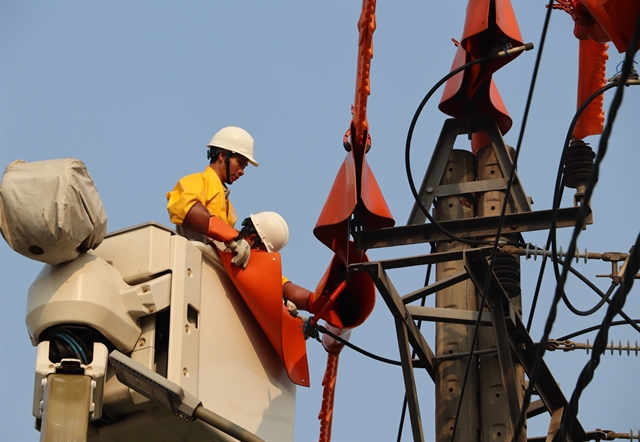.jfif) Opinion
Opinion


|
| Technicians from Quảng Binh Power Company repair a power line in the central Quảng Bình Province. — VNA/VNS Photo |
Hà Tất Thắng, director general of the Department of Work Safety (under the Ministry of Labour, Invalids and Social Affairs) speaks to Vietnam News Agency (VNA) on technology application and policies to ensure workers' health and safety.
What is your assessment of occupational safety in the current context?
Due to the impacts of COVID-19, many companies have had to cut working hours, leading to delayed production. However, as business operations resume, many serious accidents on the job occur due to insufficient technical checks and maintenance. In addition, safety training and updates for workers are also not promptly conducted.
According to a report by the Ministry of Labour, Invalids and Social Affairs, in 2022, the number of fatalities due to occupational accidents decreased, but the figure still has the tendency to rise further. This is why businesses and inspection agencies must stay vigilant and put more focus on occupational safety and health in the period of post-pandemic economic recovery and while increasing business and production activities.
How can digitalisation and technology in business and production increase occupational health and safety?
Using technology and equipment is essential in the current context, as machinery can replace humans in heavy and toxic working environments. It can also significantly reduce hazards, stress and overtime pressure on workers. In addition, the digitalisation of the workplace can support managers in better management and create more coherent workflows.
For example, innovations in technology and equipment in the mining and construction industries have created significant changes. Coal mining has applied new technology such as using mining machines or hydraulic struts or steel support frames to improve safety conditions for workers; while also installing automatic monitors for atmospheric conditions to soon detect and prevent possible risks.
However, high-risk occupations always have unpredictable hazards, especially when workers are not properly trained about the job and on occupational health and safety, as well as not timely updated of safe working practices. This easily leads to accidents that affect their health and even take their lives. Therefore, business managers must always pay attention and have plans for training, inspection and supervision, while also utilising technology in management and administration.
Maintaining traditional working practices and applying technology in management require a legal framework for administrative penalties, inspection and supervision to ensure health and safety. There must be a comprehensive working process between the State and mid-level management agencies, businesses and labourers for higher effectiveness.
How will new policies on occupational accident insurance and diseases be implemented?
In the system of policies on occupational health and safety, especially with the 2015 Law on Occupational Safety and Health, we have sent proposals to relevant departments, the National Assembly also issued policies to prevent occupational accidents and diseases.
Articles 55 and 56 of the Law on Occupational Safety and Health state the level of support for the prevention of job accidents and diseases, aiming to provide assistance to State management agencies and businesses. The deduction from the revenue of the insurance fund for occupational accidents and diseases does not exceed 10 per cent.
This support helps businesses prevent and provide training on occupational safety and health, as well as occupational change for workers who have accidents on the job and could not continue pursuing their career.
The insurance fund for occupational accidents and diseases provides certain compensation and supports those who are injured and their families to cover expenses. If the workers unfortunately suffer from occupational diseases, they can benefit from this policy in the long term.
We are also finalising a draft on voluntary occupational accident insurance for freelance workers, which is expected to be submitted to the Government for promulgation this year. Participating in this insurance, workers in the informal sector will benefit from all policies as those working in the formal sector. — VNS




